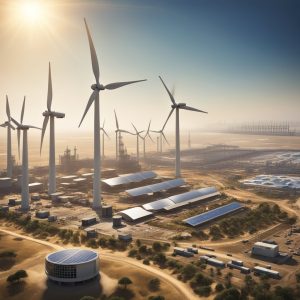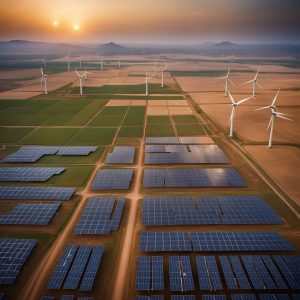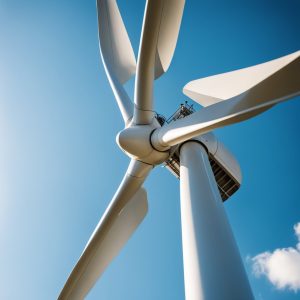Africa’s energy markets are undergoing significant changes as the continent seeks to balance economic growth with sustainable development. With an increasing emphasis on renewable energy technologies, there is a demand for skilled professionals who can navigate this evolving landscape. Further education in the energy markets in Africa is crucial for developing the expertise needed to implement and manage efficient power systems.

Opportunities for education in this field range from specialized courses, provide valuable insights into the challenges and opportunities within Africa’s energy markets, focusing on transitioning from traditional to renewable energy sources. By investing in further education, individuals and institutions can help drive Africa’s energy transition toward a more sustainable and climate-resilient future. This not only supports the continent’s economic development but also addresses critical environmental and health concerns.
Key Takeaways for further educatio in Africa’s Energy Markets
- Further education is essential for managing Africa’s evolving energy markets.
- Specialized courses and reports offer valuable insights into renewable energy.
- Education in energy markets supports sustainable development and climate resilience.
Context of Energy Markets in Africa
Africa’s Energy Markets are diverse, influenced by varying levels of development, resource availability, and economic needs.
Energy demand on the continent is rising sharply due to population growth and urbanization.
Despite significant growth, many African countries still face significant energy poverty, with millions lacking access to modern energy services. In 2021, the number of people without electricity increased by 4% compared to 2019 (IEA key findings).
Economic growth and energy security are closely linked. Investments in energy infrastructure are critical for boosting GDP. In 2024, energy investments in Africa are projected to reach around USD 110 billion (World Energy Investment 2024).
The need for sustainable energy solutions is underscored by commitments to the Paris Agreement. Renewable energy sources, such as solar and wind, are becoming more prominent. Over the past decade, Africa has added more than 26 GW of renewables-based generation capacity (Renewable Energy Market Analysis).
Energy investments vary across regions. For instance, East Africa saw investments totaling USD 3.9 billion in renewable energy. Such investments are essential for enhancing energy security and reducing dependence on fossil fuels.
To tackle energy poverty and ensure economic growth, African countries have an opportunity to leapfrog traditional fossil fuel technologies and transition to more sustainable energy systems (Renewable Energy Transition). This transition plays a vital role in meeting both immediate energy needs and long-term sustainability goals.
Investing in renewable energy not only addresses energy poverty but also creates jobs and improves overall energy security, crucial for the continent’s future.
Energy Access and Electricity Infrastructure

Energy access and electricity infrastructure in Sub-Saharan Africa involve significant challenges and potential. The region experiences widespread electricity deficits, but various innovative approaches aim to bridge the gap.
Current State of Electricity Access
In Sub-Saharan Africa, approximately 600 million people live without electricity. This lack of access hinders economic growth and development. The International Energy Agency reports that financing needs for energy access initiatives are substantial, with annual investments falling short by billions of dollars.
Infrastructure and Grid Development
Africa’s electricity infrastructure is often outdated and insufficient to meet growing demand. Investment in grid development is crucial to expanding access. Upgrading existing grids and constructing new infrastructure are necessary to connect remote communities.
Innovative funding and international support are essential to achieve these upgrades and expansions.
Challenges in Electrification
Electrification in Africa faces numerous obstacles. Financial constraints, political instability, and logistical difficulties create hurdles in expanding electricity access. The Africa Energy Outlook 2022 notes that crises have reversed trends in improving access, leading to an increase in the number of people without electricity.
Additionally, utilities in many regions face deepening financial difficulties.
Role of Mini-Grids and Stand-Alone Systems
Mini-grids and stand-alone systems provide promising solutions to electrification challenges. These decentralized energy systems can bypass the need for extensive grid infrastructure and deliver power to remote areas. They are often quicker to deploy and scalable to community needs.
Adopting such systems can significantly enhance energy access and reduce the electricity gap in Sub-Saharan Africa.
Investment and Finance in the Energy Sector
Investment and finance play crucial roles in the development of Africa’s energy sector, shaping economic outcomes and employment opportunities. Additionally, international support and climate finance are vital components for driving energy transitions on the continent.
Financing Energy Projects
Energy projects in Africa largely depend on a mix of public and private investment. Governments and state-owned enterprises often initiate projects, but private firms and households also play significant roles. For instance, Botswana and Mauritius have investment-grade ratings, making them more attractive for financial inflows. Development finance institutions and commercial lenders provide additional capital, ensuring diverse funding streams.
Economic Impact and Employment
Investing in energy infrastructure has a direct economic impact and creates numerous jobs. Clean energy projects, such as renewable power generation, dominate recent investments. These ventures generate jobs in construction, maintenance, and operations, contributing significantly to economic growth. The International Renewable Energy Agency emphasizes that renewable energy projects can provide sustainable employment opportunities for local populations. This not only boosts economic development but also enhances energy security.
International Funding and Climate Finance
International funding is pivotal for the energy sector, particularly through climate finance mechanisms. South Africa’s Just Energy Transition Investment Plan, funded by an $8.5 billion package from the European Union, UK, and US, exemplifies how international collaborations support energy transitions. Climate finance helps lower the barriers for clean energy investments, enabling projects that might otherwise be financially unfeasible. Development finance institutions also play a crucial role by supplementing local investments, ensuring that resources are available for sustainable energy initiatives.
Renewable Energy Technologies and Resources

Africa holds significant potential for renewable energy development, with vast resources and ongoing advancements in clean energy technologies. These efforts aim to enhance energy efficiency and ensure sustainability across the continent and Africa’s Energy Markets.
Renewable Energy Resources in Africa
Africa is endowed with substantial renewable energy resources. The continent boasts over 40% of global reserves of key minerals like cobalt, manganese, and platinum, essential for technologies such as batteries and hydrogen applications.
Solar energy has shown significant growth, accounting for the largest additions in renewable capacity. Wind power is also expanding, particularly in coastal and high-altitude regions. Hydropower remains a vital component, with untapped potential in many rivers across the continent. Biomass and geothermal resources further diversify Africa’s renewable energy portfolio.
Advancements in Clean Energy Technologies
Technological advancements are crucial for Africa’s renewable energy transition. Solar photovoltaic (PV) systems have become more efficient and cheaper, making them accessible to a broader population. Innovations in battery storage, partly driven by the continent’s mineral wealth, are enhancing the reliability of solar energy by addressing intermittency issues.
Wind turbine technology has also improved, with larger and more efficient turbines being deployed. Advances in grid technology, such as smart grids, facilitate better integration of renewable sources. Additionally, innovations in geothermal and biomass technologies are becoming more viable, contributing to the sustainable energy mix.
Energy Efficiency and Sustainability
Energy efficiency plays a critical role in Africa’s renewable energy landscape. Efficient appliances and industrial processes can significantly reduce energy consumption, thereby maximizing the benefits of renewable resources. Retrofitting existing infrastructure with energy-efficient technologies is a growing trend, promoting reduced wastage.
Sustainability initiatives are enhancing the long-term viability of renewable energy projects. Programs focusing on community involvement and environmental protection ensure that energy developments benefit local populations and ecosystems. Policies promoting low-carbon energy solutions further support these efforts, aligning with global climate objectives.
These combined efforts in renewable resources, technological advancements, and sustainability practices are paving the way for a cleaner and more resilient energy future for Africa.
Energy Policy, Regulation, and Market Dynamics

Government initiatives and regulatory bodies play a pivotal role in shaping the energy landscape. Additionally, market policies and cooperative efforts among various energy associations contribute to Africa’s evolving energy markets.
Governmental and Regulatory Frameworks
Governmental and regulatory frameworks in Africa are crucial for facilitating energy sector reforms. The Regulatory Governance Index (RGI), which assesses the efficiency and effectiveness of the regulatory environment, highlights how well these frameworks promote sustainable and equitable market conditions.
Countries adopting robust regulatory measures ensure the alignment of economic, financial, environmental, and social objectives. For example, Energy Regulation in Africa discusses the dynamics and challenges in achieving these objectives. Efficient regulatory frameworks enhance investor confidence and encourage investments in renewable energy projects, enabling better energy access and reliability.
Energy Markets and Economic Policies
Economic policies governing energy markets influence the supply and demand structures. Policy instruments like subsidies, tariffs, and tax incentives are designed to spur investments in renewable energy.
Additionally, economic policies can drive the adoption of innovative technologies, ensuring a balanced energy mix and fostering economic growth. The IEEE Transactions on Energy Markets, Policy and Regulation highlight multi-energy supply systems and evolving market dynamics. Effective economic policies help maintain a competitive market environment, reducing the cost of energy infrastructure projects and enhancing the overall efficiency of the energy sector.
African Energy Associations and Cooperatives
African energy associations and cooperatives play a significant role in promoting sustainable energy practices. They act as intermediaries, bridging gaps between local communities, governments, and international bodies.
Associations such as the African Union for Conservation of Nature (AUCN) and various national cooperative unions help in implementing community-based energy projects. These organizations encourage participatory governance and ensure that energy policies are inclusive and reflect local needs.
Their efforts also include capacity-building initiatives, technical support, and advocacy for policy reforms, as detailed by the NREL. By facilitating collaboration among stakeholders, these associations contribute towards a cohesive and resilient energy market in Africa.
Environmental Impact and Climate Change Considerations

Effective strategies for addressing climate change and its impact on the environment are crucial in the transition to sustainable energy markets in Africa. This includes mitigation practices, adaptation to variabilities, and reducing emissions.
Climate Change Mitigation Strategies
Climate change mitigation involves reducing greenhouse gas emissions through various approaches. Increased use of renewables such as solar, wind, and hydroelectric power can significantly cut down on carbon emissions. Implementation of these clean energy transition solutions not only helps in combating global warming but also provides economic benefits by creating jobs in new energy sectors.
Furthermore, policies must support the development of energy-efficient technologies and systems. Investments in smart grids and battery storage are vital. COP27 emphasized the global commitment to reducing carbon footprints, underlining the importance of integrating these technologies into national energy plans.
Adaptation to Climate Variabilities
Adapting to climate variabilities involves modifying infrastructure and societal systems to withstand changing climate conditions. In Africa, this might include building climate-resilient infrastructure to prevent damage from severe weather events. Water management systems need improvement to ensure resources during periods of drought.
Policy frameworks should promote resilience through agricultural innovation and urban planning that minimizes vulnerability. Additionally, education and training in sustainable practices help communities adapt to and manage environmental challenges effectively. Adaptation strategies are essential to protect communities and maintain stable energy supplies amidst climate unpredictability.
Carbon Footprint and Emission Reductions
Reducing the carbon footprint is integral to achieving sustainable development goals. Africa’s reliance on fossil fuels for energy production contributes significantly to environmental degradation. Transitioning to low-carbon energy sources is imperative to curtail emissions.
Programs incentivizing renewable energy adoption can drive down emission levels. Educational initiatives play a key role in promoting awareness about carbon footprints. Implementing strict regulations on industrial emissions and enhancing public transportation options also contribute to emissions reductions. Comprehensive strategies combining policy, technology, and education efforts are needed to achieve targeted emission reduction goals.
Case Studies: National Perspectives on Energy Growth

Each African nation has adopted unique strategies to enhance their energy markets, reflecting diverse challenges and opportunities. This section explores specific national initiatives driving energy growth, focusing on key advancements and regulatory frameworks.
South Africa’s Energy Landscape
South Africa has been proactive in tackling its energy challenges, largely due to the implementation of its National Energy Act. The act aims to diversify energy sources, significantly reducing reliance on fossil fuels. The Renewable Energy Independent Power Producer Procurement Programme (REI4P) is a central initiative under this act.
Despite its abundant coal reserves, South Africa faces high investment risks in renewable energy due to underdeveloped funding mechanisms. Investment in renewable energy projects remains vital for the country’s transition to a sustainable energy future. More details on these developments can be found in the study on South African energy.
Renewable Energy Initiatives in Kenya and Ethiopia
Kenya and Ethiopia have both prioritized renewable energy as part of their national energy strategies. In Kenya, geothermal energy has played a crucial role, contributing significantly to the national grid. The Olkaria Geothermal Plant is a notable project, enhancing Kenya’s renewable energy capacity.
Ethiopia, with its vast hydropower potential, has also made strides. The Grand Ethiopian Renaissance Dam is a landmark project expected to revolutionize the country’s energy landscape. These initiatives align with the broader goals outlined in the Africa Energy Outlook.
Morocco’s Success in Energy Efficiency
Morocco has become a leader in energy efficiency and renewable energy adoption in North Africa. Its National Energy Strategy focuses on increasing the share of renewable energy to 52% by 2030. The Noor Solar Complex in Ouarzazate is a key example of the country’s commitment to solar energy.
This strategy not only reduces greenhouse gas emissions but also strengthens energy security. Morocco’s progress is a noteworthy example of how regulatory frameworks and strategic investments can lead to significant improvements in energy efficiency.
Rwanda’s Electricity Access Strategy
Rwanda’s approach to improving electricity access involves a mix of grid expansion and off-grid solutions. The Energy Sector Strategic Plan aims to achieve universal access to electricity by 2024. Off-grid solar energy solutions are particularly important in rural areas, where traditional grid extension is less feasible.
Rwanda’s investment in mini-grids and solar home systems has been critical in meeting these ambitious goals. By focusing on both urban and rural areas, Rwanda provides a comprehensive model for increasing electricity access in Africa.
Each of these national perspectives highlights the varied approaches African nations are taking to improve their energy markets, reflecting the continent’s diverse landscape and priorities.
Future Outlook and Strategic Directions

Africa’s Energy Markets stand at a pivotal juncture, with promising trends and strategic shifts poised to shape the continent’s energy future. Key focus areas include achieving universal energy access and fostering sustainable energy systems.
Prospects for Universal Energy Access
Efforts to provide universal energy access in Africa are gaining momentum. The International Energy Agency emphasizes increased deployment of distributed energy resources like solar mini-grids and off-grid solutions. These technologies can rapidly expand reach while being cost-effective and environmentally friendly.
Agriculture and rural livelihoods can greatly benefit from these advancements. Enhanced energy access supports irrigation, mechanization, and refrigeration. This transforms agricultural productivity and food security. Moreover, promoting clean cooking fuels will reduce health risks associated with traditional biomass fuels and decrease deforestation rates.
In urban areas, the rise of electric vehicles offers a pathway to reducing carbon emissions and enhancing air quality. Investment in infrastructure for these technologies, such as charging stations and grid enhancements, is critical. Ensuring that these solutions are inclusive and affordable is vital for widespread adoption and sustainable growth.
The push for sustainable energy systems needs robust policies, investments, and international collaborations. These efforts align with broader goals of economic development, climate resilience, and improved quality of life across the continent.
Frequently Asked Questions
Africa’s Energy Markets encompasses numerous complexities, from financing private projects to addressing energy poverty. This segment covers critical questions, emphasizing specific aspects like educational programs and renewable energy potential.
What are the key components of financing private power projects in Africa?
Financing private power projects in Africa involves creating a viable financial structure, ensuring government support, and securing investments from international bodies. The Africa Energy Market Place emphasizes collaborative investment platforms to foster private sector involvement.
How does risk mitigation play a role in the growth of energy markets in Africa?
Risk mitigation is crucial for attracting investments in African energy markets. It includes measures like political risk insurance, credit guarantees, and technical assistance. These tools help reduce potential losses and stabilize investment conditions, making projects more appealing to international investors.
What potential does renewable energy hold for the future of African energy?
Renewable energy presents significant opportunities for Africa. According to the Renewable Energy Market Analysis, investments in renewable sources increased ten-fold from 2000 to 2020. Distributed renewable solutions, such as mini-grids, are vital for expanding access in off-grid regions.
Which educational programs in Africa focus on project finance within the energy sector?
Several educational institutions in Africa offer programs targeting project finance in the energy sector. These programs aim to equip students with the skills needed to manage financial aspects of energy projects, emphasizing sustainable and renewable practices.
What are the major barriers to resolving energy poverty in African countries?
Energy poverty in Africa is driven by factors such as inadequate infrastructure, limited access to financing, and political instability. As reported by the Africa Energy Outlook 2022, these challenges have led to an increase in the number of people without electricity access.
How is the African energy sector adapting to the global energy transition?
Africa’s Energy Markets are progressively aligning with global energy transition trends by increasing investments in renewable energy. Countries are adopting policies that encourage sustainable development, integrating large-scale renewable projects, and focusing on regional cooperation to enhance energy security.

